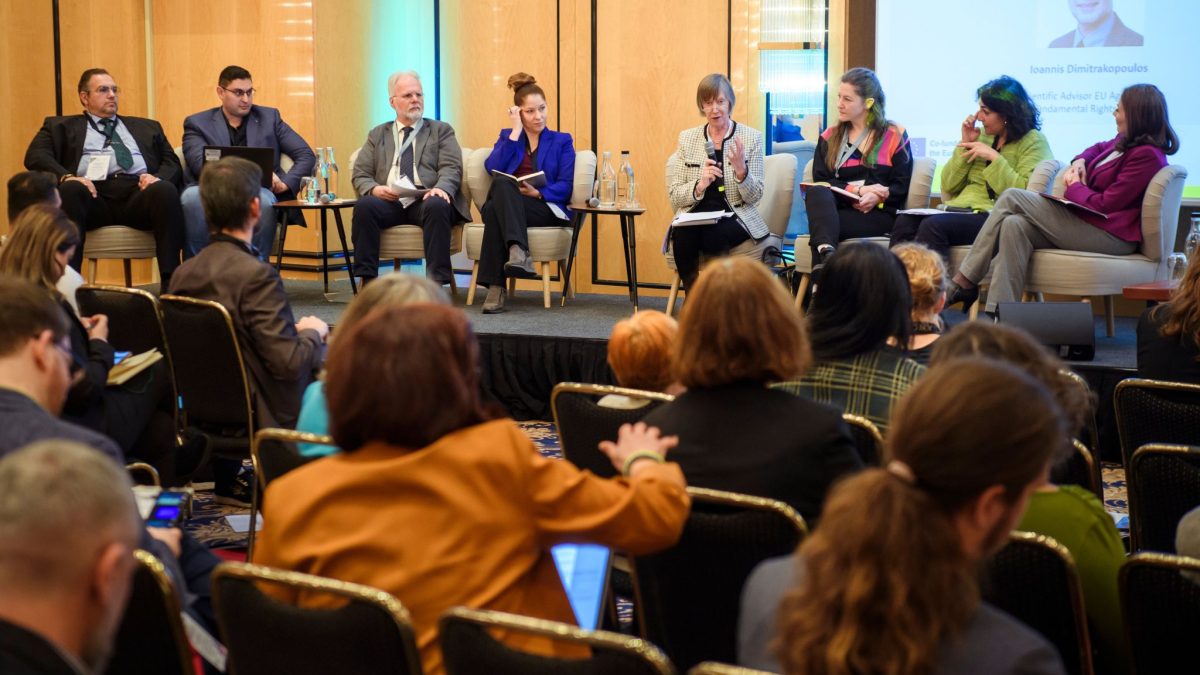Organised by the European Network of Equality Bodies (Equinet) and the German Federal Anti-Discrimination Agency (FADA), a high-level conference was held in Berlin on 14 December 2023, dedicated to establishing common standards for equality bodies across Europe. The Ombudswoman, Tena Šimonović Einwalter, participated as the representative of the European Commission against Racism and Intolerance (ECRI), alongside representatives of European institutions, national governments, equality bodies, civil society and other stakeholders.
During the panel discussion titled “Societal perception and expectations for national equality bodies”, the Ombudswoman was joined by, among others, Michaela Moua, EU Anti-Racism Coordinator, and Member of the European Parliament Romeo Franz.
Šimonović Einwalter recalled ECRI’s earlier efforts in drafting and adopting standards for equality bodies, particularly General Policy Recommendation No. 2 (GPR 2) to the Council of Europe member states, adopted back in 1997, which emphasized the need to establish specialised bodies to combat racism. She highlighted the importance of the revision of GPR 2 in 2017, especially as she chaired the Working Group that drafted the Revised GPR 2, which contains detailed recommendations to strengthen equality bodies, with a particular emphasis on ensuring their independence. She stressed that GPR 2 served as an influential document for subsequent EU efforts in this area, including the European Commission’s 2018 Recommendation on standards for equality bodies, as well as the drafts of two forthcoming directives.
She also reflected on the importance of cooperation between ECRI and national equality bodies in advancing equality across Europe, underlining the need to further strengthencooperation with civil society, as well as between the Council of Europe and EU institutions, to strengthen equality and improve the efficiency of anti-discrimination systems—especially in the challenging times ahead.
The broader goal of the conference was to raise awareness and deepen the understanding—particularly among decision-makers—of the crucial role national equality bodies play in advancing equality and combating discrimination across Europe. A key tool in this regard is the anticipated adoption of two EU directives introducing binding standards for equality bodies.
In December 2022, the European Commission proposed two directives: a Council Directive on standards for equality bodies, and a Directive of the European Parliament and of the Council on standards for equality bodies in the field of equal treatment between women and men in employment and occupation. These directives aim to strengthen equality bodies and underline their essential role in combating discrimination and supporting victims. For the first time, they would set legally binding minimum standards that member states must uphold regarding the mandate and independence of equality bodies, including sufficient resources and appropriate powers, as well as ensuring their accessibility to the public. This means states will be legally obliged to guarantee that equality bodies are free from external influence—including in their structure, mandate, budget, and staffing, and organisational matters. EU member states will have to provide equality bodies with the human, technical and financial resources needed to perform their duties effectively.
The conference also saw the presentation of the publication Measuring Standards for Equality Bodies: Indicators for Self–Assessment, which contains detailed and precise indicators for self-assessment by equality bodies. These indicators cover mandate, independence, and resources, and were developed within the Project on Standards for Equality Bodies, led for four years by the Ombudswoman Šimonović Einwalter.
More about Equinet’s self-assessment standards for equality bodies related to mandates, independence and available resources can be found [here ].


